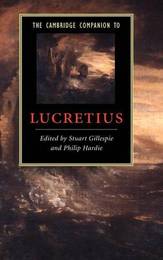
|
The Cambridge Companion to Lucretius
Hardback
Main Details
| Title |
The Cambridge Companion to Lucretius
|
| Authors and Contributors |
Edited by Stuart Gillespie
|
|
Edited by Philip Hardie
|
| Series | Cambridge Companions to Literature |
|---|
| Physical Properties |
| Format:Hardback | | Pages:384 | | Dimensions(mm): Height 229,Width 152 |
|
| Category/Genre | Literary studies - classical, early and medieval |
|---|
| ISBN/Barcode |
9780521848015
|
| Classifications | Dewey:871.01 |
|---|
| Audience | | Tertiary Education (US: College) | | Professional & Vocational | |
|---|
| Illustrations |
14 Halftones, unspecified; 1 Line drawings, unspecified
|
|
Publishing Details |
| Publisher |
Cambridge University Press
|
| Imprint |
Cambridge University Press
|
| Publication Date |
18 October 2007 |
| Publication Country |
United Kingdom
|
Description
Lucretius' didactic poem De rerum natura ('On the Nature of Things') is an impassioned and visionary presentation of the materialist philosophy of Epicurus, and one of the most powerful poetic texts of antiquity. After its rediscovery in 1417 it became a controversial and seminal work in successive phases of literary history, the history of science, and the Enlightenment. In this 2007 Cambridge Companion experts in the history of literature, philosophy and science discuss the poem in its ancient contexts and in its reception both as a literary text and as a vehicle for progressive ideas. The Companion is designed both as an accessible handbook for the general reader who wishes to learn about Lucretius, and as a series of stimulating essays for students of classical antiquity and its reception. It is completely accessible to the reader who has only read Lucretius in translation.
Author Biography
STUART GILLESPIE is Reader in English Literature at the University of Glasgow. PHILIP HARDIE is Senior Research Fellow at Trinity College, Cambridge.
Reviews"It is one of the most innovative and most successful volumes in a highly successful series, an essential work of reference that could help the future direction of Lucretian studies." -Charles Martindale, University of Bristol, Translation & Literature
|